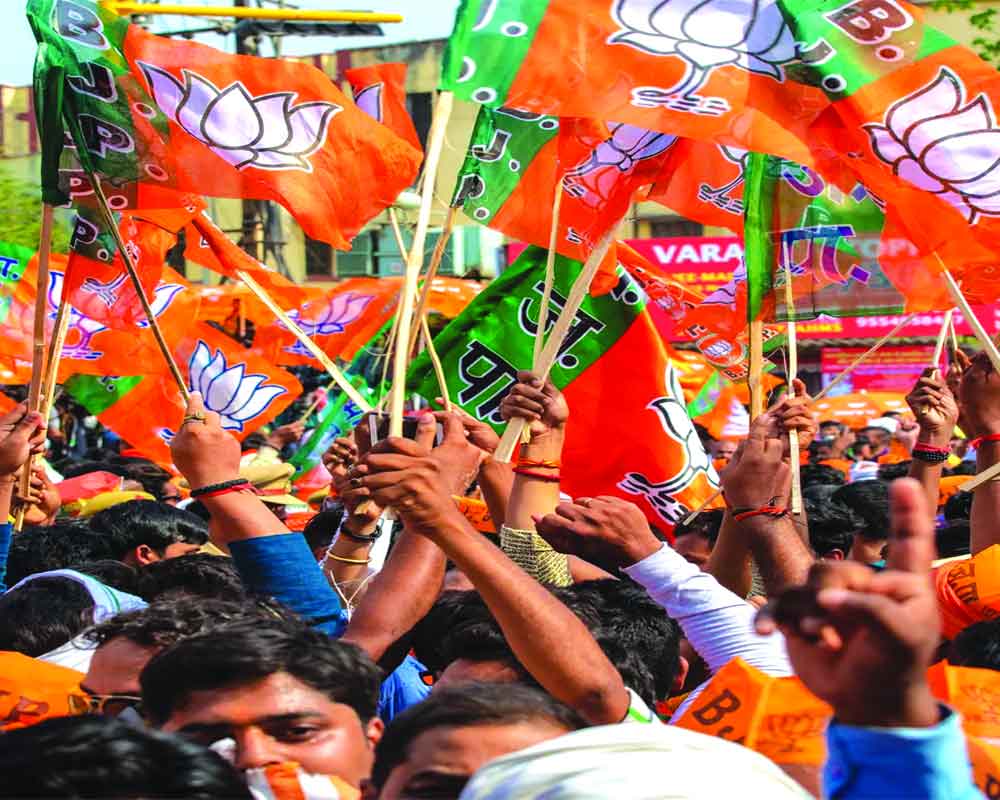One of the 80 Lok Sabha constituencies of Uttar Pradesh, Ghaziabad Lok Sabha constituency, considered as one of the most VIP constituencies and a gateway of the State is all set to witness a three-cornered fight between BJP, Congress and BSP for April 26 polls. The Ghaziabad Lok Sabha seat has gained a reputation for being a stronghold of the BJP with the party’s candidates consistently winning by significant margins in the three elections held in this constituency, and the BJP’s vote share increasing with each successive election, further solidifying their position in this constituency.
The Ghaziabad Lok Sabha seat will witness a triangular contest in the general elections. The BJP has fielded Atul Garg, replacing sitting MP General (retired) VK Singh. The Congress has given ticket to Dolly Sharma and BSP has pitted Nand Kishor Pundir against the other two. The constituency has been a BJP stronghold and the party will be hoping to repeat its show in the previous two elections. Though the BJP has retained the seat since 2009 and is eyeing win for the fourth consecutive time.
Garg is currently a Member of Legislative Assembly (MLA) in Uttar Pradesh from Ghaziabad seat in the district. The party has fielded him on the seat, hoping to hand over the seat once again to the party. The BJP is banking on Modi’s charisma. Notably, the Rajput Jat community also held a series of maha panchayats across western Uttar Pradesh, calling for a boycott of BJP candidates. Members of the Jat community — considered a traditional voter base of BJP ally Rashtriya Lok Dal (RLD) — held two meetings, one in Indirapuram on Sunday and the other near Bamheta on April 18, to discuss their stand during these elections. Their leaders said their list of grievances against the ruling party was a long one.
The Ghaziabad parliamentary seat this time has 14 candidates in the fray and Garg, a Vaish, has a major fight on his hands from Congress candidate Dolly Sharma, a Brahmin, and Bahujan Samaj Party (BSP)’s Nandkishor Pundhir, a Thakur. Interestingly, two relatives of Pundhir also in the electoral fray as independent candidates here.
The opposition is trying hard to get Kshatriya discontent in their favour against the ruling party in western Uttar Pradesh when hundreds from the community from Ghaziabad, Hapur, Meerut, Bulandshahr and Gautam Budh Nagar participated in a “Kshatirya Swabhiman Mahasammelan” in Dhaulana in Hapur district last week. The Dhaulana area is part of Satha-Chaurasi belt which has 60 villages belonging to Shishodia Rajputs while 84 belong to Tomar Rajputs and these villages fall under different parliamentary constituencies of Ghaziabad, Meerut and Gautam Budh Nagar.
The BSP first named Anshay Kalra as its candidate from Ghaziabad but the party took a U-turn on Monday last and named Thakur Nandkishor Pundhir as its candidate. The BSP on March 29 announced Kalra’s candidacy in the presence of its senior party leaders. According to BSP leaders, Kalra could not fulfill documentary formalities and the party leadership decided to offer the ticket to Pundhir. Meanwhile, change of candidate has provided a weapon to opposition BJP and Congress to criticize the BSP.
The Congress, a part of the Indian National Developmental Inclusive Alliance (INDIA) bloc, has given a chance to Sharma, a local candidate. Sharma, an MBA by qualification, is a member of All India Congress Committee besides being a party spokesperson. She was earlier associated with her own business but joined politics in 2017.
Ghaziabad, was established as a Lok Sabha constituency in 2008 as part of the delimitation of parliamentary constituencies based on the recommendations of the Delimitation Commission of India, which was constituted in 2002.The Ghaziabad constituency comprises five assembly seats namely Loni, Muradnagar, Sahibabad, Ghaziabad and Dholana with more than 27 lakh voters during 2019 Lok Sabha elections, this seat comes among the highest number of voters category in the state. The Hapur Lok Sabha seat was renamed as Ghaziabad in 2008. Ghaziabad constituency is a general seat and not reserved for Scheduled Castes (SCs) and Scheduled Tribes (STs).
There were 27,28,978 voters in the Ghaziabad constituency during the 2019 Lok Sabha Elections. Out of this, 15,19,938 voters were male and 12,08,931 were female voters. 109 voters belonged to the third gender. 2,564 were postal votes in the constituency. The number of service voters in Ghaziabad in 2019 was 2,846 (2,662 were men and 184 were women).
In the 2019 Lok Sabha elections, Ghaziabad witnessed a 55.78% voter turnout in the year 2019. BJP’s VK Singh won with a victory margin of 5,01,500 votes, securing 9,44,503 votes. Singh defeated Suresh Bansal of the SP, who got 4,43,003 votes.
In 2014, the total number of voters in the Ghaziabad constituency was 23,57,553. Out of this, 13,33,055 voters were male and 10,24,455 were female voters. 43 voters in this constituency belonged to the ‘others’ category. There were 653 postal votes in the constituency. The number of service voters in Ghaziabad in 2014 was 1,959 (1,307 were men and 652 were women).


























